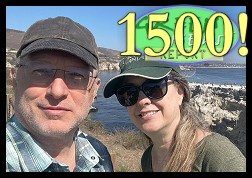 As we noted when citing the excellent recent episode of Fox' COSMOS, which explained the causes and dangers of global warming in a way that turned a long-time, self-described "climate denier" colleague of ours into a "believer," the documented facts of science don't require "belief." Scientific facts are still true, whether one chooses to believe them or not.
As we noted when citing the excellent recent episode of Fox' COSMOS, which explained the causes and dangers of global warming in a way that turned a long-time, self-described "climate denier" colleague of ours into a "believer," the documented facts of science don't require "belief." Scientific facts are still true, whether one chooses to believe them or not.
One of the great strengths of COSMOS host Neil deGrasse Tyson's explanation of climate change in the episode is that he did not hedge bets to satisfy the misinformed beliefs of science deniers. The show simply taught the science of global warming and what is both known and unknown about it. Period. That would seem to be the very central point of science education. But it's a point that is being forgotten, or lost, or simply ignored by some science museums when it comes to teaching the science of global warming, according to a report by Anna Kuchment of the Dallas Morning News.
Kuchment's central example is Dallas' Perot Museum of Nature and Science and their display celebrating Texas' energy boom. "Some [of the museum's] choices are scientifically questionable," James S. Russell understated for Bloomberg News shortly after the $185 million dollar facility first opened in December of 2012.
The Morning News found that some such institutions are failing to accurately portray the science of global warming and climate change, in part, "to avoid stirring up controversy with donors, visitors and political representatives."
The paper cites the energy exhibit at the Perot Museum which "failed to display a panel that spelled out the link between burning fossil fuels, higher concentrations of carbon dioxide in the atmosphere and a warming planet."
Museum officials claim the omission of the panel, which was part of the exhibition's original design, was little more than an oversight or that the panel was "incorrectly designed to fit its space" --- and that they have now "ordered a temporary panel to hang in its place until a new one can be manufactured" after the matter came to light. But those explanations seems fairly thin...particularly once the main funders of both the museum itself and this particularly exhibit are taken into consideration...
A caption below a photo of what looks like a smokestack added: "Humans have altered Earth's climate by burning coal and other fossil fuels that release carbon dioxide," according to an image of the panel provided by the Perot Museum and by the panel's designer.
...
The hall [in which the panel was supposed to hang] is named for The Rees-Jones Foundation, which was started by Chief Oil & Gas founder, president and CEO Trevor Rees-Jones and his wife, Jan.
The philanthropy has given more than $25 million to the museum. Locally based ExxonMobil, whose CEO recently questioned the link between carbon dioxide emissions and global warming, gave more than $1 million to the museum.
Forrest Hoglund, a longtime natural gas executive who is on the museum's board and led the $185 million campaign to build it, said the subject is too complex and fast-changing to tackle in a permanent exhibit. "Climate's always changing, and always has," he said. "So there's a lot of information out there and a lot of misinformation."
Yes. Misinformation. Like that being quoted by the fossil fuel executive Hoglund.
That whole "climate's always changing, and always has" line is a favorite, of late, of the last of the dead-ender climate science deniers. It sounds a lot like it's true, but it isn't, at least without caveats that explain that something always forces the climate to change. Such changes (short of immediate catastrophic events, such as an asteroid collision) tend to take thousands or millions of years to effect the climate, instead of just decades, as we are now seeing with CO2-forced climate change that just happens to have coincided with the unprecedented burning of fossil fuels since the beginning of the Industrial Age; and that there is no known parallel in the history of mankind --- or of Earth --- for the rapid climate change scientists are now documenting and warning about.
Then there's the small point that, even had the original panel been included in the exhibit as originally planned and designed, it was incredibly misleading in and of itself.
As the Morning News' Kuchment points out later in the article...
It suggests that the burning of fossil fuels and volcanic eruptions are equally responsible for global warming, when "humans now are emitting 100 times as much carbon dioxide as volcanoes are, so it's not even close," said Andrew Dessler, a climate scientist at Texas A&M University in College Station.
In any event, Kuchment suggests that it's unlikely the panel's disappearance was simply an oversight. "It is rare for portions of exhibitions to go missing, said two experts familiar with science museums. Exhibition directors are typically fastidious about conducting walk-throughs and matching up plans with installations to make sure nothing has gone awry. If errors occur, staffers typically catch and correct them promptly, they said."
The rest of the article cites similar hedging being done by museum directors elsewhere, as well.
"It is about the most politically controversial topic that we can take on right now," Paul Martin, Senior Vice President for Science Learning at the Science Museum of Minnesota in St. Paul told the paper. Other museum officials describe the self-censorship that science museums are now engaging in, in hopes of avoiding "controversy" (and, obviously, the risk of lost funding from supporters and profiteers of the most profitable industry in the history of civilization) when purporting to teach the public about science.
"We try to avoid saying things that are not necessary to be said," Carolyn Sumners, Vice President for Astronomy and the Physical Sciences at the Houston Museum of Natural Science is quoted as saying. Her museum, according to the Morning News, "doesn't use the term 'global warming' except in a historical context, such as the natural warming that took place during the time of the dinosaurs."
This is a pity, a disservice, and even an outrage. Kuchment notes that a 2010 survey of science museum visitors found that 73% "said that they would like to learn more about climate change and that they trusted informal science institutions more than any other source to provide that information."
"The fact that many [museums] were being intimidated into silence was doing a big disservice to many visitors, who were coming to them as a trusted source," says Anthony Leiserowitz of the Yale Project on Climate Change Communication, which carried out the survey.
Kuchment reports Leiserowitz' comments as suggesting "that museums need not fear a public backlash if they tackle the subject." But I'm not so sure. The paper cites Anne Haskel, the Perot Museum's former chief development and public affairs officer (until 2009), who "previously worked at The Field Museum in Chicago and at the Guggenheim Museum in New York City," as saying that "no company, foundation or individual she has worked with in Texas has ever asked to be involved in content decisions."
Yet, at the same time, Van Romans, the President of the Fort Worth Museum of Science and History notes that donors are allowed to review exhibits before they open to the public.
"Like the Perot, the Fort Worth museum hosts a large energy hall and scant references to climate change," writes Kuchment. "The museum's donors 'are certainly courteous, and I want to be very courteous and good to our funders who are in the energy business,' Romans told her, adding: "Do they tell me every inch of every piece of information in every exhibit? No. But they deserve to be shown what we're going to exhibit, absolutely."
Texas A&M University climate scientist Andrew Dessler goes on to tell the paper, according to Kuchment, that "museums stress the climate's natural variability in order to avoid controversy. Natural variability is a factor, but scientists agree that humans bear most of the responsibility for present-day climatic shifts."
"My sense is that this is a common approach," Dessler said. "The museums say, 'We can't not talk about humans, but let's try to talk about them as little as possible.'"
That's not science. That's anti-science censorship. And it's being done --- by scientists and those who profess to love science --- for a reason.
[Hat-tip to too-infrequent BRAD BLOG guest-blogger D.R. Tucker]


 Sunday 'Total Obliteration' Toons
Sunday 'Total Obliteration' Toons Thank You For Your Attention to This Matter:
Thank You For Your Attention to This Matter: 'Green News Report' 6/26/25
'Green News Report' 6/26/25
 Mamdani Primary 'Win' Augurs New Generation of Progressives Rising: 'BradCast' 6/25/25
Mamdani Primary 'Win' Augurs New Generation of Progressives Rising: 'BradCast' 6/25/25 U.S. Authoritarianism Under-way (But We're Still Here to Fight It): 'BradCast' 6/24/25
U.S. Authoritarianism Under-way (But We're Still Here to Fight It): 'BradCast' 6/24/25 'Green News Report' 6/24/25
'Green News Report' 6/24/25 'Anti-War' Trump Attacks a Mid-East Nation on False Claims About WMD: 'BradCast' 6/23/25
'Anti-War' Trump Attacks a Mid-East Nation on False Claims About WMD: 'BradCast' 6/23/25  Sunday 'Peacemaker' Toons
Sunday 'Peacemaker' Toons Senate Health Care Cuts 'More Extreme' Than House Version: 'BradCast' 6/19/25
Senate Health Care Cuts 'More Extreme' Than House Version: 'BradCast' 6/19/25 'Green News Report' 6/19/25
'Green News Report' 6/19/25 What 'Anti-War President'? MAGA Civil War Over Trump, Iran: 'BradCast' 6/18/25
What 'Anti-War President'? MAGA Civil War Over Trump, Iran: 'BradCast' 6/18/25 Trump Calls for 'Remigration', a Codeword for 'Ethnic Cleansing': 'BradCast' 6/17/25
Trump Calls for 'Remigration', a Codeword for 'Ethnic Cleansing': 'BradCast' 6/17/25 'Green News Report' 6/17/25
'Green News Report' 6/17/25 Last Weekend Today: 'BradCast' 6/16/25
Last Weekend Today: 'BradCast' 6/16/25 Sunday 'Despot Times, Despot Measures' Toons
Sunday 'Despot Times, Despot Measures' Toons Then They Came for the U.S. Senators: 'BradCast' 6/12/25
Then They Came for the U.S. Senators: 'BradCast' 6/12/25 'Green News Report' 6/12/25
'Green News Report' 6/12/25 Lawless Trump Warms Up for Insurrection Act: 'BradCast' 6/11/25
Lawless Trump Warms Up for Insurrection Act: 'BradCast' 6/11/25 Trump Inciting Violence, State of Fear in L.A., Elsewhere: 'BradCast' 6/10/25
Trump Inciting Violence, State of Fear in L.A., Elsewhere: 'BradCast' 6/10/25 Nevermind Elon and Epstein Files, Trump Declares L.A. 'Riots'!: 'BradCast' 6/9/25
Nevermind Elon and Epstein Files, Trump Declares L.A. 'Riots'!: 'BradCast' 6/9/25 'Jesus Weeps' at Trump's
'Jesus Weeps' at Trump's 300k 'Preventable' Deaths Since Trump USAID Shutdown: 'BradCast' 6/4/25
300k 'Preventable' Deaths Since Trump USAID Shutdown: 'BradCast' 6/4/25 Storm Warnings: 'BradCast' 6/3/25
Storm Warnings: 'BradCast' 6/3/25 SCOTUS Ignores Own Precedents In Recent 'Emergency' Rulings: 'BradCast' 6/2/25
SCOTUS Ignores Own Precedents In Recent 'Emergency' Rulings: 'BradCast' 6/2/25 'A World of Tyrants, Bribes, and Influence': 'BradCast' 5/22/25
'A World of Tyrants, Bribes, and Influence': 'BradCast' 5/22/25
 VA GOP VOTER REG FRAUDSTER OFF HOOK
VA GOP VOTER REG FRAUDSTER OFF HOOK Criminal GOP Voter Registration Fraud Probe Expanding in VA
Criminal GOP Voter Registration Fraud Probe Expanding in VA DOJ PROBE SOUGHT AFTER VA ARREST
DOJ PROBE SOUGHT AFTER VA ARREST Arrest in VA: GOP Voter Reg Scandal Widens
Arrest in VA: GOP Voter Reg Scandal Widens ALL TOGETHER: ROVE, SPROUL, KOCHS, RNC
ALL TOGETHER: ROVE, SPROUL, KOCHS, RNC LATimes: RNC's 'Fired' Sproul Working for Repubs in 'as Many as 30 States'
LATimes: RNC's 'Fired' Sproul Working for Repubs in 'as Many as 30 States' 'Fired' Sproul Group 'Cloned', Still Working for Republicans in At Least 10 States
'Fired' Sproul Group 'Cloned', Still Working for Republicans in At Least 10 States FINALLY: FOX ON GOP REG FRAUD SCANDAL
FINALLY: FOX ON GOP REG FRAUD SCANDAL COLORADO FOLLOWS FLORIDA WITH GOP CRIMINAL INVESTIGATION
COLORADO FOLLOWS FLORIDA WITH GOP CRIMINAL INVESTIGATION CRIMINAL PROBE LAUNCHED INTO GOP VOTER REGISTRATION FRAUD SCANDAL IN FL
CRIMINAL PROBE LAUNCHED INTO GOP VOTER REGISTRATION FRAUD SCANDAL IN FL Brad Breaks PA Photo ID & GOP Registration Fraud Scandal News on Hartmann TV
Brad Breaks PA Photo ID & GOP Registration Fraud Scandal News on Hartmann TV  CAUGHT ON TAPE: COORDINATED NATIONWIDE GOP VOTER REG SCAM
CAUGHT ON TAPE: COORDINATED NATIONWIDE GOP VOTER REG SCAM CRIMINAL ELECTION FRAUD COMPLAINT FILED AGAINST GOP 'FRAUD' FIRM
CRIMINAL ELECTION FRAUD COMPLAINT FILED AGAINST GOP 'FRAUD' FIRM RICK SCOTT GETS ROLLED IN GOP REGISTRATION FRAUD SCANDAL
RICK SCOTT GETS ROLLED IN GOP REGISTRATION FRAUD SCANDAL VIDEO: Brad Breaks GOP Reg Fraud Scandal on Hartmann TV
VIDEO: Brad Breaks GOP Reg Fraud Scandal on Hartmann TV RNC FIRES NATIONAL VOTER REGISTRATION FIRM FOR FRAUD
RNC FIRES NATIONAL VOTER REGISTRATION FIRM FOR FRAUD EXCLUSIVE: Intvw w/ FL Official Who First Discovered GOP Reg Fraud
EXCLUSIVE: Intvw w/ FL Official Who First Discovered GOP Reg Fraud GOP REGISTRATION FRAUD FOUND IN FL
GOP REGISTRATION FRAUD FOUND IN FL





































